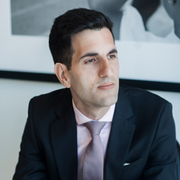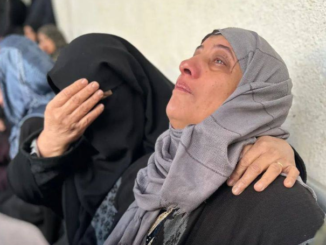
I’m writing this from Istanbul where I recently moved. There’s been a lot of adjusting to do so I wasn’t sure whether I’d actually materialize.
At some point, I accepted it wouldn’t. I had too much in the way of finding housing, registering documents with the government, and working full-time at a natural broadcaster—all at once—that hardly afforded me the time (let alone mental energy) for the article. And soon I’d forget what I wanted to write about.
But a gnawing sense that the article should be written never let me. Some part of me said that not doing so would mean failing to share something that might be of some value to advance the discussion on Palestinian justice.
That sense reached a pitch in late April when I revived notice that Canadians for Justice and Peace in the Middle East (CJPME) released “Legitimizing Hate: Canadian Politicians Advertise on Racist Website”.
The report addresses the same thing that this article is largely about: Zionist exceptionalism. And that evidence or instances of it, embodying the idea that Israeli Jews are better than the rest of us, are not to be found in Israel itself but in Canada too.
The urgency with which the article suggests this must be tackled, among fighting other sorts of Zionist harms, encouraged me to stop everything I’m doing in Istanbul and write the article.
No matter how busy we are and wherever we are geographically Palestinian justice must be prioritized. We cannot take a break from our collective struggle from it, lest our fellow Palestinian brothers and sisters needlessly suffer more at the hands of Israel. In all its permutations, whether governed by the current far-right Benjamin Netanyahu leadership or otherwise, it is directly shaped and informed by the exceptionalism in question.
In my first few days in Istanbul, this had been weighing on my mind. Just before leaving Canada—having come across articles shrouded as “journalism” but the aim of which was to further promote Zionist exceptionalism—I was reminded of a Toronto attended late last year.
Writing about it for this publication the event featured a presentation by Regavim—a settler advocacy group that petitions the Israeli government to expedite the illegal evictions of Palestinians. I was disturbed enough by the anti-Palestinian racism that characterized the presentation, often denigrating the Bedouin (Palestinians in Area C of the West Bank) as “primitive”, “less than”, and “parasites” on the land.
What’s more, the racism was reinforced by high-impact slides, containing misleading stats and digital imagery (e.g. computer-based maps of where Bedouins are “squatting”) though with the obvious attempt to make the presentation seem empirically legit. As several of my Canadian-based Palestinian allies noted, having to put up with this while remaining calm and quiet is bad enough.
But unfortunately, that’s what I had to do if I was to try to understand and make sense of the message Regavim was in Toronto to convey, as well as its attendant hatred.
Particularly unsettling about the event is something that happened after it. I didn’t write about it in the aforementioned piece for The Palestine Chronicle. I wasn’t sure at the time how it’d figure into what the piece’s focus was, namely the illegality and immorality of Regavim—as a group.
A gentleman approached me. He was apparently one of the main organizers of the event. He wanted to know who I was.
“You’re a new face,” he said to me, then introduced himself.
“I’m Paul,” I replied. “I thought I’d come to the talk because I’m concerned about Regavim’s role in the Middle East”.
I didn’t want to reveal I was a pro-Palestinian opponent of the group already and my primary reason for being there was to produce an article reflecting that. This could have quickly ended our conversation and who knows, given Regavim’s hostility towards Palestine, what else.
I did, however, offer: “I’m bothered by what sounds Regavim is trying to do, based on the presentation we just heard. We should be respecting cultural differences and not be advocating that cultures be moved or displaced if, for whatever reason, we don’t like them”.
This engaged him enough for him, in turn, to share that he believed certain cultures, while implying European ones should be universally regarded as exemplary, are “better” than others.
That was not all. If you were among the better cultures you were not only entitled but had a duty to “expand”—imperialistically, just of course as Israel continues to do in Palestine and White Europeans, the world over, have done for centuries. This involves committing abominable acts against indigenous populations, which both Israel and White Europeans alike view as “expendable, “getting I the way” of their colonial goals.
The following racist viewpoint—put forth by Canadian writer Max Roytenberg, in his recent article “Jewish Lives Matter MORE”—parallels my interlocutor’s thinking. It reflects the intolerable falsehood that the “exceptionality” of certain groups means they should lord others.
Moreover, it’s cited in the CJPME report, illuminating the larger subculture of Jewish-identifying Zionists (this qualification is important as not all Zionists are Jews and vice versa) who believe themselves as having a special status (in the imagined human hierarchy that informs their distorted outlook), befitting those who ought to lord–even if against their consent—others:
Jewish lives not only matter, but they matter more. Why? They matter more because their existence contributes more to the public good than the lives of other ethnic groups. Wow! That statement will set the cat loose among the pigeons!
What I know is that humanity benefits from a precious resource that is almost a necessity for the world’s common good, the existence of the Jews. This dynamism of this tiny fraction of the world population deserves to be recognized for what it is and what it could be if properly appreciated.
Aside from the material devastation Zionism, as embodied through Israeli militaristic force, has forced countless Palestinians to endure, the idea that Jewish lives “matter more” not only underlies Zionism’s exceptionalism. It also, reinforced by Roytenberg’s crude and (perhaps ironically) antisemitic idea of Jews as “precious resources” (as if things and not sentient beings that all persons are), speaks to the troubling way Zionists relate to most humanity.
They look down on it. After all, we’re not as important as them, deserving, say, the contemptuous title of “Jew hater” nearly every time we harshly criticize Israel for doing what no state should ever do (e.g. bomb defenseless Palestinians in Gaza).
On the other hand, Zionists seem hardly to mind when other countries are condemned for the actions that, in spirit, are similar to human rights violations Israel commits. For example, Zionists do not routinely call critics of the United States “anti-Christian”, “anti-White”—any pejorative that says one is hateful toward the “traditional” American—who rightfully denounce it for its violent (and illegal) invasion of Iraq or Afghanistan.
They don’t like however when they are held to account. They don’t want the same standards of law, dignity, just and fair ways of treating all peoples to apply to them. They, as they confirm every time they are called out for the criminal harm they do, believe themselves to be entitled to hurt others with impunity. But if we do it, as lowly people, it’s a different story. Under Zionist exceptionalism it always is.
By the same token support for Israeli aggression is dangerous. It emboldens proponents of Zionist exceptionalism, encouraging them to further compromise the lives of Palestinians (its primary victims) and Palestinian allies, such as through compromising their employment status—the cases of David Miller (Bristol University) and Ken Roth (Harvard University) being two examples in recent memory.
In truth, Zionists are no better than anyone. Until they realize that, which goes along with finally discarding Zionist exceptionalism itself as having any legitimate basis, we cannot expect them to be prudent and judicious in how—collectively—they ought to act towards Palestinians.
They will continue to be like the gentlemen I met: blind to the humanity we share, Zionist and non-Zionist alike, with all.

– Paul Salvatori is a Toronto-based journalist, community worker and artist. Much of his work on Palestine involves public education, such as through his recently created interview series, “Palestine in Perspective” (The Dark Room Podcast), where he speaks with writers, scholars and activists. He contributed this article to The Palestine Chronicle.








